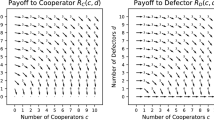Abstract
Considered in this article is a class of resource dilemma games designed to study interactive decision behavior in the face of both strategic and environmental uncertainty. Groups of n members are asked to share a common resource pool whose exact size, x, is not known. Rather, x is sampled randomly from a uniform probability distribution which is common knowledge. Each group member j(j=1,...,n) requests r j units from the random resource pool. Individual decisions are made independently and anonymously. Preplay communication is prohibited. If (r 1+r 2+...+r n )≤ x, each member j is granted his/her request; otherwise, group members get nothing. We derive the Nash equilibrium solution for this resource dilemma game, and compare it to an expected utility model originally proposed by Suleiman and Rapoport (1988). We then show that the equilibrium solution accounts for the major qualitative features of experimental results reported in two previous studies.
Similar content being viewed by others
References
Baden, J. (1977). “Population, Ethnicity, and Public Goods: The Logic of Interest-Group Strategy.” In G. Hardin and J. Baden (eds.), Managing the Commons. San Francisco: Freeman.
Budescu, D.V., A. Rapoport, and R. Suleiman. (1990). “Resource Dilemmas with Environmental Uncertainty and Asymmetric Players.” European Journal of Social Psychology 20, 475–487.
Bush, R.R. (1963). “Estimation and Evaluation.” In R.D. Luce, R.R. Bush, and E. Galanter (eds.), Handbook of Mathematical Psychology, Vol. I. New York: Wiley.
Dawes, R.M. (1980). “Social Dilemmas.” Annual Review of Psychology 31, 169–193.
Dawes, R.M., J. Delay, and W. Chaplin. (1974). “The Decision to Pollute.” Environment and Planning 6, 3–10.
Dawes, R.M., J. McTavish, and J. Shaklee. “Behavior, Communication, and Assumptions About Other People's Behavior in a Common Dilemma Situation.” Journal of Personality and Social Psychology 35, 1–11.
Hardin, G.R. (1968). “The Tragedy of the Commons.” Science 162, 1243–1248.
Harley, C.B. (1981). “Learning the Evolutionary Stable Strategy.” Journal of Theoretical Biology 89, 611–633.
Kerr, N.L. (1983). “Motivation Losses in Small Groups: A Social Dilemma Analysis.” Journal of Personality and Social Psychology 45, 819–828.
Marwell, G., and R.E. Ames. (1979). “Experiments on the Provision of Public Goods I: Resources, Interest, Group Size, and the Free Rider Problem.” American Journal of Sociology 84, 1335–1360.
Maynard Smith, J. (1982). Evolution and the Theory of Games. Cambridge: Cambridge University Press.
Maynard Smith, J. (1984). “Game Theory and the Evolution of Behavior.” The Behavioral and Brain Sciences 7, 95–125.
Messick, D.M., and M.B. Brewer. (1983). “Solving Social Dilemmas: A Review.” In L. Wheeler and P. Shaver (eds.), Review of Personality and Social Psychology 44, 11–44.
Messick, D.M., H. Wilke, M.B. Brewer, R.M. Kramer, P.E. Zemke, and L. Lui. (1983). “Individual Adaptations and Structural Change as Solutions to Social Dilemmas.” Journal of Personality and Social Psychology 44, 294–309.
Murnighan, J.K., T.R. King, and F. Schoumaker. (1990). “The Dynamics of Cooperation in Asymmetric Dilemmas.” Advances in Group Processes 7, 179–202.
Myerson, R.B. (1986). “An Introduction to Game Theory.” In S. Reiter (ed.), Studies in Mathematical Economics. Washington, DC: Mathematical Association of America.
Ordeshook, P.C. (1986). Game Theory and Political Theory. Cambridge: Cambridge University Press.
Ostrom, V., and E. Ostrom. (1977). “A Theory for Institutional Analysis of Common Pool Problems.” In G. Hardin and J. Baden (eds.), Managing the Commons. San Francisco: Freeman.
Rapoport, A. (1988). “Provision of Step-level Goods: Effects of Inequality in Resources.” Journal of Personality and Social Psychology 54, 432–440.
Rapoport, A., and R.B. Boebel. (1992). “Mixed Strategies in Strictly Competitive Games: A Further Test of the Minimax Hypothesis.” Games and Economic Behavior, 4, 261–283.
Rapoport, A., D.V. Budescu, R. Suleiman, and E. Weg. (In press). “Social Dilemmas with Uniformly Distributed Resources.” In W.B.G. Liebrand, D.M. Messick, and H.A.M. Wilke (eds.), A Social Psychological Approach to Social Dilemmas. New York: Pergamon Press.
Rasmusen, E. (1989), Games and Information: An introduction to Game Theory. Cambridge, MA: Blackwell.
Roth, A.E. (1988). “Laboratory Experimentation in Economics: A Methodological Overview.” The Economic Journal 98, 974–1031.
Rutte, C.G., H.A.M. Wilke, and D.M. Messick. (1987). “Scarcity or Abundance Caused by People or the Environment as Determinants of Behavior in the Resource Dilemma.” Journal of Experimental Social Psychology 23, 208–216.
Samuelson, C.D., and D.M. Messick. (1986a). “Alternative Structural Solutions to Resource Dilemmas.” Organizational Behavior and Human Decision Processes 37, 139–155.
Samuelson, C.D., and D.M. Messick. (1986b). “Inequities in Access to and Use of Shared Resources in Social Dilemmas.” Journal of Personality and Social Psychology 51, 960–967.
Samuelson, C.D., D.M. Messick, C.G. Rutte, and H.A.M. Wilke. (1984). “Individual and Structural Solutions to Resources Dilemmas in Two Cultures.” Journal of Personality and Social Psychology 47, 94–104.
Suleiman, R., and A. Rapoport. (1988). “Environmental and Social Uncertainty in Single-trial Resource Dilemmas.” Acta Psychologica 68, 99–112.
Author information
Authors and Affiliations
Rights and permissions
About this article
Cite this article
Rapoport, A., Suleiman, R. Equilibrium solutions for resource dilemmas. Group Decis Negot 1, 269–294 (1992). https://doi.org/10.1007/BF00126266
Issue Date:
DOI: https://doi.org/10.1007/BF00126266




